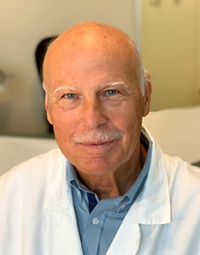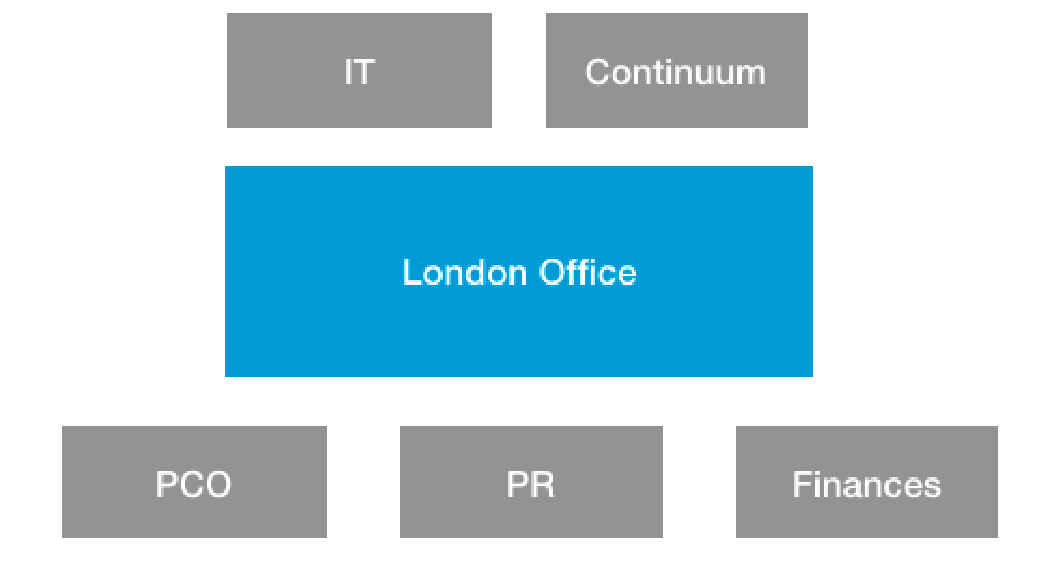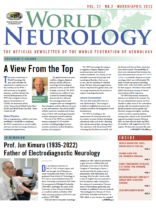
Wolfgang Grisold
This is the second issue of World Neurology this year, and I will take the opportunity to update you on the activities of the WFN. I will comment on the global situation, and then describe the internal developments of the WFN also in regard to future aspects, the persistence of COVID, the important advent of the “Intersectoral Global Action Plan” (IGAP) and World Brain Day 2022, “Brain Health for All.”
Global Situation
Due to ongoing wars, conflicts, and crises worldwide, I would like to emphasize the WFN‘s statements on armed conflict and wars and also encourage donation to professional organizations.
The global situation on wars, conflicts, refugees, displaced persons, and the effects on neurology and neurological patients is severe, and the WFN is deeply concerned. The WFN condemns any conflicts of war. It cannot be stressed enough that our role is to advocate for neurology, patients and caregivers who are endangered in these situations, and the reduction of access to care and treatment. Any armed conflict will also cause new casualties and victims, many of them with neurological sequelae and also subsequent mental conditions.
The role of the WFN as a scientific society, composed of 123 member societies, is building bridges between societies, members, medical disciplines, patients, and caregivers.
The WFN encourages the support to migrants, refugees, displaced and stateless persons, and victims of conflict worldwide. As a charity, we are primarily concerned with people with neurological disorders, their access to care, and the provision of essential drugs. We have indicated organizations that are experienced in global crises, and encourage donations for the purpose to support neurological patients.
Internal Developments
The year 2022 marked the time of a new administration. The strategy is to build on established structures and evolution as well as the integration of new developments.
The WFN is working on the improvement of communication with its member societies, further developing educational tools, such as the e-learning hub and educational days, among others. The experience with the previous WFN e-learning days has been successful, and the format and time of these events has been well accepted. The possibility of short-term educational interventions has been demonstrated in a recent SNO-WFN webinar on scientific advances on neuro-oncology, which was well-attended. We want to thank our partners including AFAN, EAN, AAN, IHS-GPAC, and SNO for their support. We believe these newly added educational concepts of virtual interventions will be important.

Basic administrative structure of the WFN in London. The office presently has four staff members who administer and coordinate the WFN affairs. External IT aspects and the management of Continuum are conducted by local and experienced collaborators (IT=information technology; PCO=professional conference organizer; PR=public relations)
The WFN has several committees, which act on behalf of the trustees. For the new administrative period, we have decided to adapt some of the committees and also add several subcommittees for specific purposes such as gender and diversity, young neurologists, teaching centers as well as a patient platform, among others. Based on the virtual WFN regional meeting in January-February 2022, we have selected chairs and filled the positions with suggestions from the regions. We have also increased the ratio of females from 10% to 40%, and we are committed to continue to adapt gender balance.
At this point, I also want to thank the outgoing chairs and members of the committees for their devotion and dedication to the WFN. Rotation of positions is necessary in such a large organization, and even if the terms end, we hope that all previous members will continue working with us supporting the WFN or in other future functions. The list of the new committees will be available on the website, and we will continue to introduce committees in World Neurology.
Other current tasks include preparation for the next Council of Delegates (COD) meeting this October 2022 in Amsterdam, where a new Secretary General and and one trustee will be elected. The WFN met with the AAN in a leadership meeting, and this is also planned with the EAN and with AOAN.
The preparation of the WCN 2023 is proceeding, and the WCN program committees have started their work. A preliminary program will appear soon. The preliminary work for WCN 2025 in Korea is also ongoing.
Define the Future
The WFN has reached a critical size and has globally a wide span of activities, which make a permanent and reliable organizing, planning and administrative structure necessary. This includes long-term planning and decisions, and availability with regard to resources both personal and financial.
The WFN, being a U.K. charity, guarantees a strict and well-assessed structure, which is taken care of by the trustees with the support of the WFN staff in London and is regularly audited each year. These administrative tasks, projects, and communicative tasks, are carried out by the office staff and externally with the help of Chiu, Helen Gallagher, our professional conference organizer (PCO), Freedman (our financial consultant), and Yakkety Yak, our public relations consultant, which make the WFN a complex structure.
Congress organization is done by a PCO, and the organization of WBD and Brain Health by a PR expert company.
We appreciate that the interest and trust in the WFN is high and increasing from the standpoint of cooperations. Any project taken up by the WFN needs administration and monitoring, and increasingly, project management tools will have to be used to define capacities to the extent that projects can be supported.
For education, the projects will be based on a needs assessment, which will be the basis of future development of all educational activities. We are also supportive of the concept of CME and Continuous Professional Development, which is lifelong learning for neurologists. There are several worldwide concepts such as the AAN’s Continuum, and the European EACCME model, which offer a widespread and detailed choice of CME educational methods and models. We are happy to say that the WFN congresses (World Congress of Neurology) are always accredited with up to 40 credits from EACCME , and we have always passed the strict and thorough definitions for these meetings. They are valid for AMA and the Canadian Royal College of Physicians.
Education in neurology is needed at all levels and is a continuous process. In addition to practical and scientific content, the importance of advocacy as well as leadership will have to be implemented in the strategy of our educational programs. We are committed to our concepts of department visits and training centers, and will report on these developments in the next issue.
COVID Is Continuing
I want to remind our readers that the COVID pandemic is not over yet, and travel and communication is still at risk. This also relates to the planning of the World Health Assembly (WHA) meeting in Geneva as well as to the COD meeting in Amsterdam.
The WFN has updated the COVID website and the Specialty Group on Tropical Neurology is providing monthly updates. Also Elsevier will provide a collection of COVID papers published in ENS (and in the future, JNS) and can be found on the COVID site: https://www.sciencedirect.com/journal/eneurologicalsci/special-issue/1006JKSX5HX.
The WFN also actively works with the WHO in several working groups on the neurological effects of COVID in both acute and late effects.
The pandemic had and still has catastrophic effects on patients and caregivers, not only as limited access to care and reduced capacities, but also medical and bureaucratic hurdles. It has to be assumed that the indirect damage to acute and chronic neurological patients is high and will take considerable time to return to normal.
As neurologists, we have to take care of the so-called soft facts such as communication, personal interaction, quality of life, and that the needs of patients and caregivers are addressed.
Intersectoral Global Action Plan (IGAP)
Much energy and effort is being invested in the WHO’s International Global Action Plan (IGAP). I want to thank my predecessor William Carroll and Alla Guekht and Kimberly Karlshoej for their continuous efforts. This is a good example of a project that will have a worldwide impact, but is also a good example of worldwide cooperation.
IGAP is about to be accepted at the WHA in Geneva in May 2022. The WFN has been working with other societies such as the ILAE, the World Stroke Organization, Movement Disorders Society, and the International Headache Society on this development.
It is based on a long and fruitful cooperation with the WHO, which has several landmarks and previous books, including two editions of the Atlas and also the development of ICD 11. This IGAP will elevate the importance of neurology worldwide and will enable countries to use this WHO initiative for the establishment or development of neurology.
A brain health unit has been created by the WHO, which indicates the importance of brain health worldwide. (https://www.who.int/health-topics/brain-health#tab=tab_1).
Once the IGAP is accepted, the implementation of the IGAP will need the full attention for new projects with the WHO and with individual societies to implement this exciting program.
World Brain Day Topic
This year‘s World Brain Day (WBD) will be dedicated to “Brain Health for All.”
It is chaired and organized by our Public Awareness Committee by Tissa Wijeratne and David Dodick, with professional assistance from Yakkety Yak, which has taken care of the last WBDs. The committee consists of representatives from the WFN regions, and it is hoped that this WBD will underline the importance of brain health globally. We hope to align with the WHO in this important activity. The intent is not only to reach as many regions as possible, but also customize our WBD tools for individual use and we hope that many, if not all, WFN member societies will be able to celebrate with the WBD in their regions and use this topic to promote neurology at all levels. The topic of this year’s WBD also aligns with the upcoming IGAP, which will be approved by the WHA in May.
The view of the WFN is that brain health has a wide span from intrauterine life toward childhood, adulthood, and into aging in regard to neurological function, dysfunction, rehabilitation, and palliative care.
The selection of the topic “Brain Health for All” is based on the WFN’s 2021 brain health campaign (https://wfneurology.org/brain-health-initiative) and the cooperation with the WHO. Also regional societies including the EAN are committed to brain health, such as the European Brain Health Summit meeting in May 2022 (https://www.ean.org/ean/advocacy/brain-health). There will also be a brain health session at the EAN congress in Vienna.
This was a short update on the current proceedings of the WFN, including several cooperations and developments. Please follow us on the website and social media.
If you have comments or questions, please contact us at info@wfneurology.org. •
